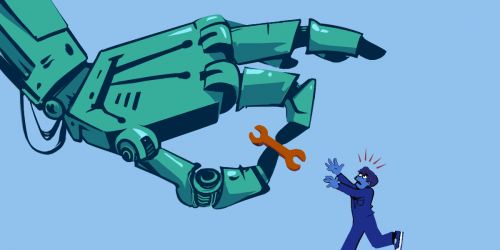2020 saw governments on three continents take action against the dominance of the biggest tech platforms, with a flurry of pro-competition rules, investigations and lawsuits. As exciting as this is, it's just the beginning. Antitrust enforcement is often a matter of years or even decades, and if history is any judge, dominant companies will seek to avert precedent-setting judgments (which might lead to breakups) and instead try to settle their lawsuits, negotiating concessions rather than taking their chances before a judge.
As an organization that yearns for the days when the Internet wasn't a group of five websites, each consisting of screenshots of text from the other four, we are excited to see this kind of enforcement underway, but that excitement is tempered by the fear that hasty, reflexive settlements and regulations might actually make the situation worse. For example, deputizing companies to perform the duties of the state by identifying and blocking unlawful speech makes it harder for new, better companies to enter the marketplace, because they can't afford the vast army of moderators that monopolists can pay for with the change they find down the back of the sofa in their campus mini-kitchens.
Interoperability Mandates
Thankfully, 2020 saw some very thoughtful approaches to competition that explicitly sought out ways to promote competition and give users more power over how their tech works, rather than blindly "punishing" companies with regulations that also raise barriers for would-be challengers. Both the U.S. Access Act and the EU Digital Services Act propose interoperability mandates—a requirement that the biggest tech companies provide managed access to their systems for startups, co-ops, and other potential competitors.
When it comes to undoing 40 years of indifferent antitrust enforcement, interoperability mandates are a great start, but they are only part of the solution. What happens if the mandatory system is sidelined by changing market conditions or deliberate subversion by monopolistic companies? And what about new technologies just a-borning: what can we do to prevent them from growing into monopolies, and starting the cycle over again?
The Good Kind of Tech Exceptionalism
There are lots of ways in which tech monopolies are unexceptional: just like many other concentrated industries, their growth was fueled by access to lots of capital, which allowed them to gobble up small companies before they could grow to be competitors; they engaged in mergers between notional competitors, making it harder for suppliers, customers, and workers to shop around for better deals; and they created vertical monopolies that cornered multiple markets.
But tech is exceptional, because it is based on universal machines (computers) and a universal network (the Internet), and that opens up the possibility of a different kind of interoperability—not the kind that is designed in from the start through standards, nor the kind imposed by a lawmaker.
Rather, this is adversarial interoperability, when you plug something in against the wishes of the person who made it, to make life better for the people who use it.
We have a name for this: Competitive Compatibility (ComCom for short).
ComCom
ComCom is deeply embedded in the history of tech. Every one of today's tech giants has a ComCom story in its history, like Apple's elegant solution to Microsoft's unreliable Office for Mac products.
But as scrappy firms become powerful incumbents, their relationship to ComCom changes: when they were using ComCom to outmaneuver the lumbering dinosaurs of a previous era, that was just “progress.” When some upstart comes along to do the same to them, that's a dangerous and illegitimate challenge to the natural order of things.
When it comes to getting their own way, monopolies have two major advantages: first, they have the extra profits that come from monopolization ("monopoly rents" in economics jargon); and second, the more concentrated an industry is, the easier it is for all the major companies in it to collude to spend those monopoly rents to buy policies that safeguard their profits.
For decades, the pirates of yore have declared themselves to be admirals and have set about ensuring that no one does unto them what they have done unto so many others. To that end, we've seen the steady expansion of cybersecurity law, copyright and para-copyright law, and patent law (as well as frightening new theories of copyright that make it much harder to use ComCom to help users escape walled gardens, lock-ins, and other anti-competitive tricks that help monopolists do monopoly.)
Telling the Tale
We spent much of 2019 and 2020 gathering and publishing the largely forgotten histories of ComCom in tech development, from the early cable TV systems all the way to the birth of fintech.
Now it's time to mobilize. As 2021's crackdowns on monopoly proceed, lawmakers, courts, and regulators will be looking for solutions. We think ComCom should be in their toolkits: we imagine courts correcting monopoly abuses by prohibiting big companies from using legal tools to fight ComCom, and governments insisting on guarantees that ComCom will be tolerated by anyone selling products to the public sector. We’d also like to see legislatures adopt rules to promote ComCom, including reforms to copyright, cybersecurity, patent, and other laws that safeguard those who make new things that connect the old.
It's nearly 2021, and long past time for a revival of the trustbusting spirit. But it's also been 130 years since America's seminal antitrust laws were passed, and so it's also long past time to adopt some new tactics to fight the eternal problem of monopoly abuse.
This article is part of our Year in Review series. Read other articles about the fight for digital rights in 2020.














